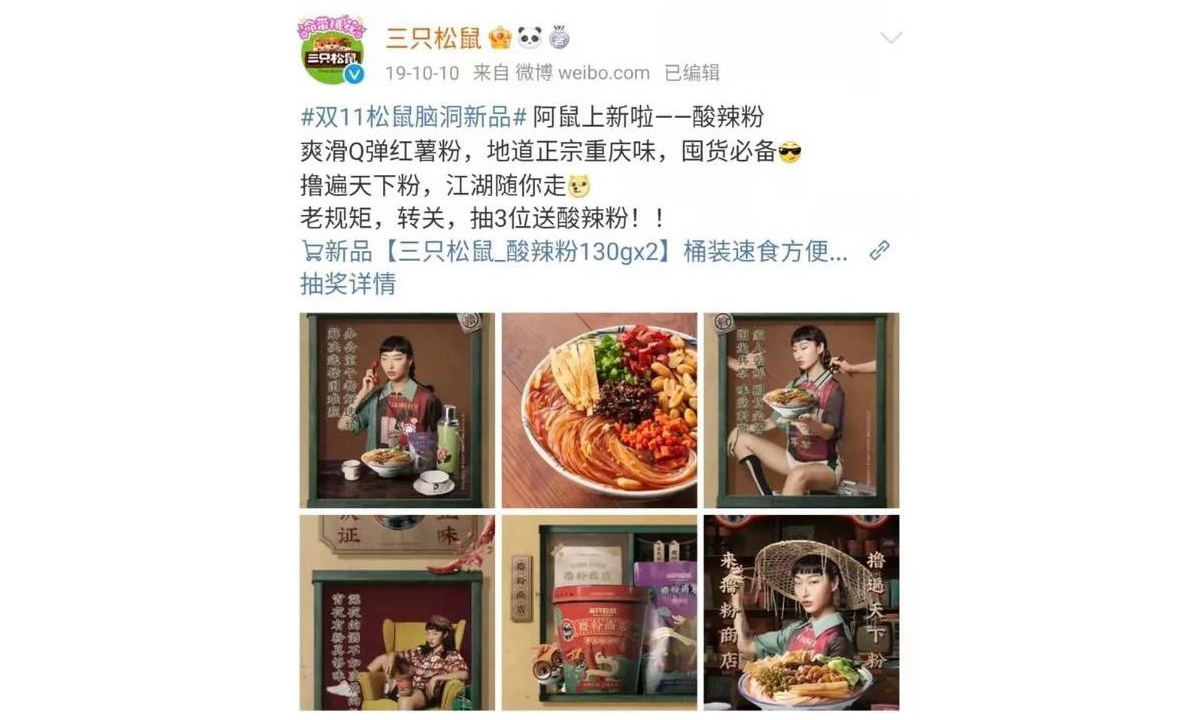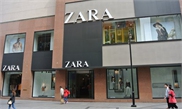
A screenshot from the Three Squirrels Weibo account
The controversy over an advertisement featuring a model with small, narrow eyes made by Chinese snacks retailer Three Squirrels continues to widen on Monday, as the Chinese model involved responded to the criticisms and German carmaker Mercedes-Benz has also been embroiled in the controversy for a similar ad.
The model, who was in the ad that ignited public fury over Western stereotypes "insulting China," wrote on social media that "does that mean I should not be a Chinese because I was born with small eyes?" Her response sparked a fresh wave of debate.
Meanwhile, some Chinese netizens on Monday found Mercedes-Benz had also used a similar ad featuring a model with small, slanted eyes. The company has not responded to the Global Times' request for comment as of press time on Monday.
The controversy started on Sunday after the Three Squirrels' ad triggered a heated debate among Chinese netizens. But even though the company has since removed the ad, the discussion continues.
"I was born with eyes like that. They are even smaller in real life. Does that mean I should not be a model because I was born with small eyes?" the model involved posted on her Weibo account under the name Cainiangniang. "I am all for patriotism… but this is kind of morbid," she added, calling on netizens to be reasonable.
On social media, some asked whether netizens have been too sensitive, while others argue that it was not about small eyes, but the makeup. The topic related to Cai's response has gained over 330 million views as of Monday evening.
"This is not the model's fault but the team behind the promotion…" Some netizens spoke for the model and blamed that there might be some people intentionally posting comments for other purposes.
Experts noted that Chinese companies and society should be more sensitive to this issue, as the discussion will help clarify the issue from more perspectives. However, the public debate should not be turned into a "political trial."
This incident was mainly a query from the public about the model's image on the advertisement, which focused on whether her small eyes were "insulting China," Zhu Wei, vice director of the Communication Law Research Center at the China University of Political Science and Law, told the Global Times on Monday.
The image of "slanted eyes" and a "braid" comes from Western stereotypes of the Chinese in the 19th century, according to Zhu. It is not an objective description of the features of the Chinese people but a Western "label" for East Asians based on their sense of ideological superiority, Zhu said.
Some voices from social media regard the advertisement as typical "orientalism," with many artistic elements derived from Western stereotypes, which are based on the imagination of Westerners.
"We do not blame the models themselves, we blame those companies which still insist on making promotions by using images that might offend Chinese to gain internet popularity or for catering to Western stereotypes about Asian people," Zhu said, "A responsible brand should not do this."
At the same time, we should "look at these matters rationally," Zhu noted, noting that it needs to be resolved through laws, not through social media.
There is no doubt that models of any kind have the right to appear on camera and a company is free to choose any model who is fit for the need of the promotion, Zhang Yiwu, a professor of cultural studies at Peking University, told the Global Times on Monday.
"It is true that the West has stereotypes toward people from Asia, not only for the Chinese, but for the East Asian community," Zhang said. He agreed that the debate is helpful to clarify the matter from more perspectives, but insisted it should not be turned into a "political trial."
In terms of the overall look, artistic elements and atmosphere of the advertisement, it was prejudiced against Chinese and had an orientalist narrative, Zhang said.
The advertisement was launched in October 2019, and the model in the photograph is Chinese and was wearing makeup that was based on her personal characteristics. There was no deliberate uglification, said a statement the company posted on Sunday on Weibo. The company apologized for it and has replaced the advertisement.
With the development of society and the changes of the consumption, merchants need to meet the new aesthetic needs of consumers and establish cultural and emotional resonance with clients, the Shanghai Consumer Council said.
It is not the first time that brands were involved in similar incident. In 2018, Italian fashion house Dolce and Gabbana posted several controversial videos showing a Chinese woman being told how to use chopsticks to eat Western food, which triggered strong reactions from Chinese netizens.
In 2019, a Chinese model pictured with small eyes also sparked a heated discussion in China over Chinese beauty and alleged stereotyping of Asians.

